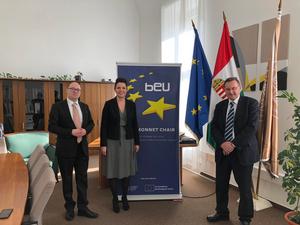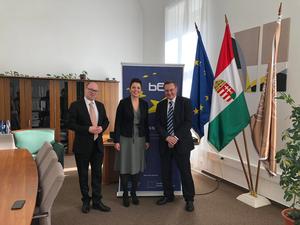Meeting of Jean Monnet Chairs at Ludovika-UPS
Dr Boglárka Koller, the vice-rector for international affairs, welcomed Dr Michael Gehler, head of the History Institute of the University of Hildesheim, accompanied by Dr Bence Bauer, director of the Matthias Corvinus Collegium Hungarian-German Institute. Professor Gehlert's research area is European history, with a focus on Austria and Germany, the history of European integration, and the transnational cooperation of Christian Democratic and Conservative parties in Europe.
The reason why they met was that like the vice-rector, the professor visiting Hungary too holds the title of Jean Monnet Chair, so both are part of the Jean Monnet European scientific network. The Jean Monnet Chair application is open to internationally renowned university professors with outstanding knowledge who specialize in teaching European studies.
During the conversation, the vice-rector presented her own Jean Monnet project, which focuses on strengthening the resilience of the EU. The credo of the project is our Europeanness, which means living together with our national identity and our Europe-centric way of thinking. The acronym of the project, bEU, i.e. be yourself and be European, expresses this exactly.
The Jean Monnet Chairs also spoke about their plans to be implemented in the near future. In response to Gehlert's question, Professor Boglárka Koller said that the theory of differentiated integration and its impact on relations between member states and the development of the future of the EU is currently at the center of her interest. Since Dr. Gehlert will soon be a visiting professor at the Gyula Andrássy University of German Language in Budapest, there is an opportunity to establish direct cooperation points. Professor Boglárka Koller recommended the scientific journals of the Ludovika University of Public Service - highlighting the only domestic EU journal, the European Mirror. The purpose of the European Mirror is to provide a real picture of European integration processes and their challenges at the beginning of the third millennium, from the perspectives of jurisprudence, economics, and political science.

